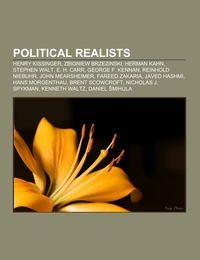Detailansicht
Political realists
Henry Kissinger, Zbigniew Brzezinski, Herman Kahn, Stephen Walt, E. H. Carr, George F. Kennan, Reinhold Niebuhr, John Mearsheimer, Fareed Zakaria, Javed Hashmi, Hans Morgenthau, Brent Scowcroft, Nicholas J. Spykman, Kenneth Waltz, Henry Kissinger, Zb
ISBN/EAN: 9781155386799
Umbreit-Nr.: 3391787
Sprache:
Englisch
Umfang: 82 S.
Format in cm: 0.5 x 24.6 x 18.9
Einband:
kartoniertes Buch
Erschienen am 09.01.2012
Auflage: 1/2012
- Zusatztext
- Source: Wikipedia. Pages: 81. Chapters: Henry Kissinger, Zbigniew Brzezinski, Herman Kahn, Stephen Walt, E. H. Carr, George F. Kennan, Reinhold Niebuhr, John Mearsheimer, Fareed Zakaria, Javed Hashmi, Hans Morgenthau, Brent Scowcroft, Nicholas J. Spykman, Kenneth Waltz, Daniel Smihula, James W. Spain, Hedley Bull, Aaron Friedberg, Barry Buzan, Robert Gilpin, Colin S. Gray, Robert Jervis, Robert J. Art, William Wohlforth, Joseph Grieco. Excerpt: Edward Hallett "Ted" Carr CBE (28 June 1892 - 3 November 1982) was a liberal and later left-wing Marxist British historian, journalist and international relations theorist, and an opponent of empiricism within historiography. Carr was best known for his 14-volume history of the Soviet Union, in which he provided an account of Soviet history from 1917 to 1929, for his writings on international relations, and for his book What Is History?, in which he laid out historiographical principles rejecting traditional historical methods and practices. Educated at the Merchant Taylors' School, London, and at Trinity College, Cambridge, Carr began his career as a diplomat in 1916. Becoming increasingly preoccupied with the study of international relations and of the Soviet Union, he resigned from the Foreign Office in 1936 to begin an academic career. From 1941 to 1946, Carr worked as an assistant editor at The Times, where he was noted for his leaders (editorials) urging a socialist system and an Anglo-Soviet alliance as the basis of a post-war order. Afterwards, Carr worked on a massive 14-volume work on Soviet history entitled A History of Soviet Russia, a project that he was still engaged on at the time of his death in 1982. In 1961, he delivered the G. M. Trevelyan lectures at the University of Cambridge that became the basis of his book, What is History? Moving increasingly towards the left throughout his career, Carr saw his role as the theorist who would work out the basis of a new international order. Carr was born in London to a middle-class family, and was educated at the Merchant Taylors' School in London, and Trinity College, Cambridge, where he was awarded a First Class Degree in Classics in 1916. Carr's family had orginated in northern England, and the first mention of his ancestors was a George Carr who served as the Sheriff of Newcastle in 1450. Carr's parents were Francis Parker and Jesse (née Hallet) Carr. They were initially Conservatives, but went over to s
